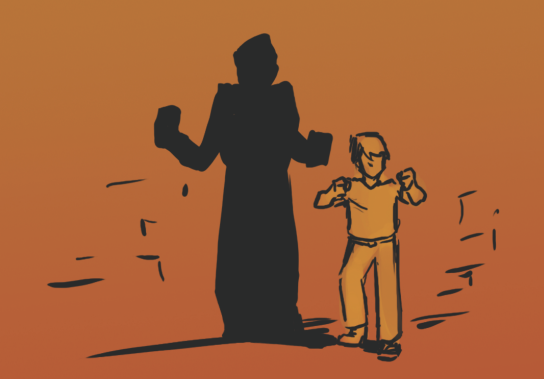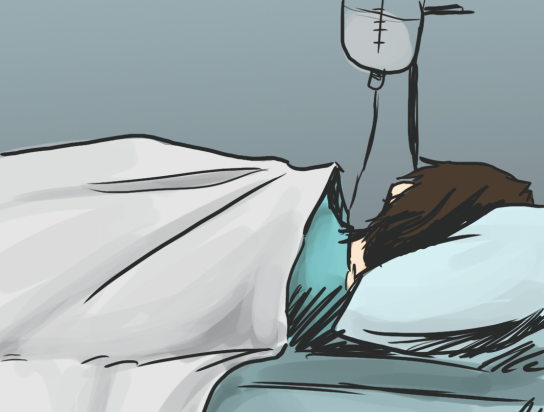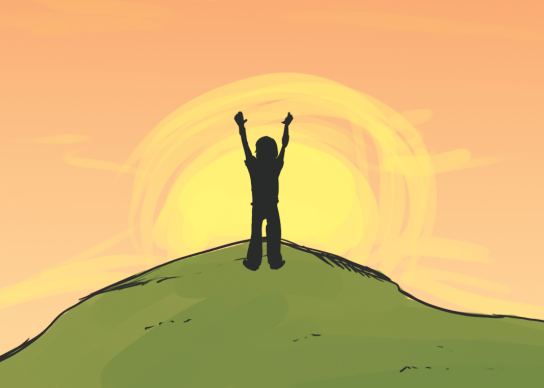Print Edition: April 3, 2013
EDITOR’S NOTE:
Six months ago, Jasper Moedt was facing the most important decision he’d ever had to make: the choice to give up and step off of a third story roof or to find a way to keep on living. Six months and several treatments and explanations later, Jasper is at peace with himself and has found the courage to speak out about the personal demons in his past.
He is now a university ambassador for the Canadian Mental Health Association, and is speaking at a district education conference in April on the importance of mental health awareness. He chose to share his story with The Cascade because he truly believes his vulnerability will allow others to speak up about their struggles and get the help they need and deserve.
— Paul Esau
When I was first asked to write this article I have to admit I wasn’t thrilled. I knew that at some point I would need to speak up, I would need to follow through on my self-talk about the importance of bringing awareness to the struggles that had plagued me for almost a year. But when I sat down to type, I froze. I had spent months and months holding everything in, and I was scared to stop hiding. Yet I realized that whether or not I liked the idea of baring some of my darkest moments, it was something that needed to be done. Like so many mental health advocates had told me over the past few months, unless I speak up I am just another part of the problem.
The beginning
Last March, I underwent shoulder surgery because of an injury I suffered playing for the varsity basketball team.
In the months following my surgery, I slowly slid into a rut. It began with a lack of emotional control – excessive fighting and arguing with those I knew I loved. I would slide into depression and then suddenly experience periods of hypomania (a feeling that I was invincible and bigger than the world). I knew something was not right in my life. I didn’t know what it was but I could feel it.
Early on I began to realize things that I had previously taken great pleasure in doing no longer appealed to me. Basketball, a sport that I had dedicated a large part of my life to, suddenly meant nothing to me. I found it difficult to sleep at night and even harder to wake up in the morning. I began to find difficulty in enjoying everyday life. I felt no spark. Most days I would drag myself through the motions in hopes it would get better. It was only during those periods of hypomania that I would feel near normal. I was dragging myself through the day waiting for those highs, which did not come often enough.
I became a shell of my former self, either depressed and too down to care about anyone around me, or too high to care or even be truly aware of the damage I was doing. I was a poisonous and difficult person to be around and I began to damage the relationships with those who had been so supportive of me.
I began to realize there was something wrong inside of me. I had always been a physically strong person who felt a strong sense of self control. In my mind, this issue was something that I could take care of myself. That was the worst decision I made throughout this ordeal; I was surrounded by people who loved me, people who would have helped me if I had just asked for help.
Then in June, I found out that my basketball coach, Barnaby Craddock, was taking a job at the University of Alberta. In a moment of hope I began to think that this might be the fix. In my altered world all I needed to do was change my external environment and all my internal problems would be solved.
By mid-June I had developed paranoid delusions about my life. Everyone was against me. Teammates, friends, family and loved ones seemed to be the target for my delusions when I was in a low. These delusions were without any reason. An example that stands out was that I began to believe my mother, who had always been there for me in every sense, was out to physically harm me. I began to fear that she intended to kill me. Completely unfounded and unreasonable beliefs similar to these began to define my thought patterns.
I pushed people away from me, denying that I needed help. I lived under the assumption that if I told anyone that I felt I didn’t have control of my emotions and thoughts they would persecute or abandon me.
The decision to leave for Alberta did not come easily. In my state of mind, it seemed like the solution to my depressive episode. But my inner thoughts became a battleground.
Day to day, week to week, I would settle on a different solution, each time genuinely believing that I had put the issue to rest for good. It was in this time that my symptoms took a serious turn for the worse.
It was mid-June when the thought of self-harm first crossed my mind. It became a constant throughout my depressive episodes. This new low was counterbalanced with new moments of elation that today I recognize as full-blown mania. As the month went on I did my best to learn to hide myself from the people around me. It was also at this time I first heard voices in my head. Initially I wasn’t sure if the voices were “real,” but as time passed the voices became more pronounced and I realized I was the only one who could hear them.
I began writing notes describing how I was feeling and notes about people I felt were conspiring against me, but most of all notes begging for help. I remember leaving them out in places people might find them in a futile cry for help.
One moment in particular stands out through the ups and downs. I was on vacation in Mexico. A few days of sun passed and I was feeling as stable as I had in months. I felt strong. Then one morning, I woke up early and left the room without telling anyone where I was going. I felt as low as I ever had from the second I woke up that morning. I found myself on the rooftop beside a hot tub. I felt the overwhelming urge to jump off the roof, three stories up.
Barefoot and shirtless, I stood there waiting for the right moment. The scene feels surreal to me, standing there in the early morning sun, fists clenched and sweating. I stood there for what seemed like forever, not debating “why jump?” but “why not?” instead. My life at this moment felt like nothing. I felt I had failed my loved ones, hurt too many people to possibly repair things. Before I could make the decision to jump a young couple came up the stairs behind me and I quickly stepped down from the ledge feeling shocked and foolish and rushed back to my room.
This was the beginning of nearly six months of suicidal fantasies. I had already pushed away my loved ones and in my delusional state, I truly believe no one could help me and all that I could do was pretend everything was normal. I began to feel like an actor. I was playing the role of my previous self, doing all I could to fit the role of myself.
It was at about this point my paranoid delusions were no longer beliefs in my head. They simply became my common knowledge of the world around me. In my mind, if I had told anyone around me, they would either abandon or persecute me. Living life was a strain.
By mid-summer I had made the decision to leave for Alberta. I packed up all my belongings and headed for Edmonton in late August.
Alberta
When I arrived I knew almost immediately that moving to Edmonton was not the solution that I had built it up to be. By the end of August, I began to experience more consistent auditory hallucinations, voices telling me that I was worse than nothing in my depressive episodes, and then voices telling me that I didn’t need anyone and I was untouchable in my periods of mania. To accompany this, I started getting splitting headaches. Maintaining “normal” social interaction became a daily test. The stress of hiding what was really going on inside of me became the greatest priority in my life.
It was during this time that I damaged my relationships the most. I began to lash out at anyone that attempted to comfort me. Those I left behind in BC just saw me as a poisonous, self-centered individual. And that was exactly what I had become.
During the first week of September, I blacked out for the first time. I experienced many similar episodes over the course of the next few months. I would lose consciousness for a moment, less than a second, and wake up again almost instantaneously. I kept this new development as quiet as I possibly could. It just played into my prior belief that if anyone knew that something was wrong, things would only get worse for me.
I dropped out of classes before I stepped in the classroom and took up a minimum wage job. Over the fall I went through too many highs and lows to describe. If I wasn’t sitting alone in my room planning self-harm or suicide, I was out at a bar drinking as much as (and sometimes more than) I could handle.
The voices in my head became the driving force behind my actions. I would lash out at people around me because the voices in my head told me I should and then go into suicidal-depressive states where I would sit and listen to voices telling me that I should end my life.
It was at that point I am confident people who knew me would have been able to see that there was something wrong. At home I had been surrounded by a loving family and close relationships and I have no doubt that if given the chance theses people would have helped me. But since the only people I regularly came into contact with had known me for less than two months, my actions generally went unnoticed or dismissed.
My life continued this way for two months. I passed out several times, but managed to play it off as a joke to friends or just not tell anyone that it had happened. I had continued to write notes, but they began to resemble suicide notes instead of pleas for help.
Just as suddenly as I had arrived, I made the decision to buy a Greyhound ticket to leave. Although this was not a well thought-out decision, it may have been the one that saved my life.
Returning home
Upon my return home, my loved ones knew something was wrong. I had become unrecognizable. My depressive periods became longer and more severe. My periods of mania seemed to come far and few between. Planning self-harm became a daily ritual. I began to hear multiple voices in my head and often felt like I lacked the will to do anything they did not want me to do. I continued to blame my behaviour on external circumstances, doing anything to deflect suspicion of mental illness.
Over this time I abused those that still wanted to be part of my life. My closest loved ones became the targets for my unhappiness. There were times when I convinced myself that my family was conspiring against me. I lashed out against them among others in a misguided attempt to regain control of my life – another delusion I had built for myself.
In was during these months that I really began to notice the physical toll this struggle had taken on me. Since my surgery in March, I had lost nearly 45 pounds. I rarely slept more than an hour or so at night and I began to experience a shaking in my hands that I could only control if I focused all my attention on it.
In early January, all my issues came to a head. I passed out, just like the times before, but this time I did not immediately wake up. I spent hours in the hospital unconscious before I was treated. My red blood cells were not functioning properly and oxygen was not being carried to my body. I had contracted anemia which had taken a serious toll on my body. It was suspected that this disorder had originated from my surgery and my body’s reaction to the the antibiotics I had been given. Over time, the anemia had gotten worse and eventually caused the severe symptoms that had landed me in the hospital.
The medical staff could not determine a clear answer as to why I had experienced such severe symptoms not normally expected of someone who is anemic. Even at this point—in the hospital surrounded by doctors who were clearly there to help me—I dared not share what had been happening in my head. I felt a paralyzed, numbing feeling. Eventually the doctors decided on treatment. I was to come in once a day for a week to receive steroid treatments and I was projected to be healthy by the end of the week. Such a simple fix did not seem possible in my mind.
Recovery
After treatment, I felt as though I came out of a fog that had surrounded me for so many months previous. It was like the world’s weight had been lifted from my shoulders. I began sleeping normally again and the depression and mania disappeared. Treatment had been successful. I had physically begun the journey back to health.
It was not until a few weeks later at a follow-up appointment that I began to talk about the symptoms of mental illness that I had experienced. I only began to talk about it once I felt I was not going to return to that state of mental illness. Doctors and specialist could not come up with a conclusive reason as to why I had experienced what I did. The best explanation I could get from my various medical caregivers was that surgeries and antibiotics can often affect the chemical balance of my brain. Imbalances in my dopamine and serotonin levels were likely to blame. Other theories were developed, but in the end, nothing held up.
The medical staff explained that the experience was an anomaly in my health and the anemia and chemical balances were interconnected and together had caused some seriously dramatic changes in my body. By treating the blood disorder, the chemical balances were somehow set right. The doctors regarded this as a miracle, it was extremely rare to find such a simple fix to a complicated issue such as chemical imbalances of the brain. None of these symptoms were anything I would ever have to deal with ever again. I was given a 100 per cent clear bill of health and multiple assurances that this whole ordeal was a thing of the past.
It took almost a month, post-treatment before I opened up to anyone outside of the medical staff about what had really gone on in my head since that surgery. I feared their reaction to my suffering; I feared they would not accept what had happened to me. I did not want use this health disorder as a crutch, I had done some terrible things over the course of ten months and caused more pain than I would have liked to remember.
At first I shared bits and pieces. Little insights into what I had gone through to test the waters. Some people were more open to what I had to say than others. I had damaged relationships; people that I had once had special connections to no longer could see me for who I was.
I had been so focused on my internal struggle that I neglected to see the hurt I had caused to the ones around me that I love. I caused real, deep, and lasting pain.
Eventually, I began to share my story with others. The process of being able to explain myself in the entirety of the story has been a raw and emotional process, but it has been something that has helped me make peace within my world.
Time heals all. Wounds heal, both my wounds and the wounds of those around me. There are people who I, to this day, have not gotten a chance to thank – never got the chance to thank for supporting me even when I had not treated them with the love they deserved. To thank them for saving my life.
Almost four months have passed since receiving a clean bill of health and the whole experience seems worlds away. I feel stronger and healthier than I ever have, mentally, physically and spiritually. I have been taking a full course load at UFV in the winter semester and, as of last week, I officially recommitted to the Cascades varsity basketball program. I feel a new perspective on life. This experience has given me the opportunity to view the world differently. This experience, as terrible as it has been, has given me a new, brighter outlook on life. Optimism runs high in my life. It is surreal for me to look back at the past year of my life and realize I did the things I did. Life is a strange and beautiful thing.
Learning from experience
I realize that the only way to set any of this right is to share my story and do my part in tackling the stigma surrounding mental illness. We live in a world where mental health is not regarded as a tangible and “real” sickness.
It would have taken tremendous courage for me to speak out about what I was experiencing at the time of it occurring. That was courage I could not find. I was a coward, unable to ask for help in the early stages while I still could. Initially I did not want to speak out about what had occurred in my life over the last year. I had recovered and had found happiness in my life again after so long, why revisit something so painful? The truth is that hiding this would be the easy way out.
Being mentally ill is not something to be ashamed of. The only way we can overcome this sickness is to speak out about it. Overcoming the stigma that comes with mental health is the first step to eliminating it from our world.
I think back to the initial stages of my illness. What if I had understood what was happening in me before I became too wound up in it? What if I had found the courage to come forward before I slid too deep?
This is my motivation to share my story. Mental health issues are a taboo topic in our society. People do not find it to be a comfortable topic to speak on. People that are willing to step forward and discuss mental health are something our society sorely needs.
The sad fact is that many university students suffer from a mental disorders on some level throughout their university years. Suffering in silence is not the answer. If we do not speak out about this issue it will never be addressed.
Everyone has a part to play. The recognition that mental health issues are all around us is desperately needed. It is something that as a university population and a society as a whole we have done a poor job of making a priority.
To address the stigma surrounding mental health is a monumental task. But it starts with each and every individual. Do your part. Talk about it.
This is me, doing mine.
“Everybody accepts that when we have a physical injury our body needs time to heal and we cannot function in the same ways until we have healed. Unfortunately, our culture/society does not accept or view the psychological systems in the same way … The result of this is that negative and unhealthy stereotypes develop around these ‘psychological injuries’ .
First, we are reluctant to acknowledge the psychological system and thus deny that an ‘injury’ has occurred. This leads to not accepting that healing and recovery is needed within these systems just as healing and recovery is needed on all other human systems.”
— Roger Friesen, sports psychologist










